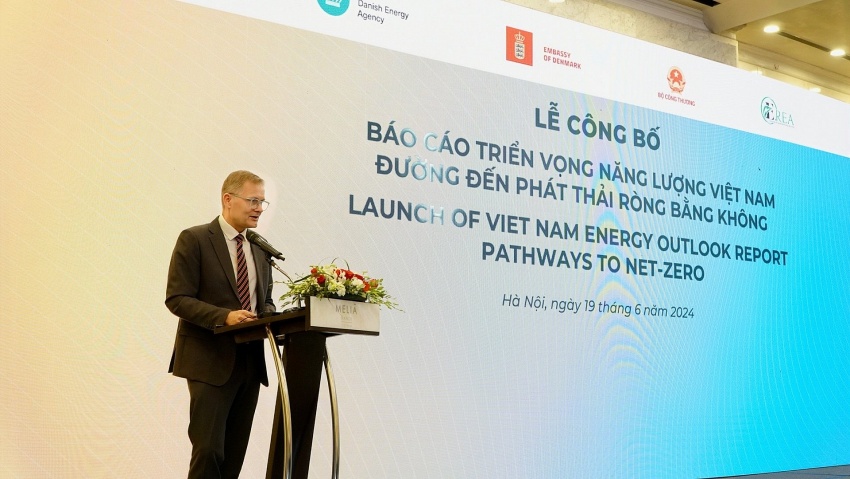
The Vietnam Energy Outlook Report - Pathways to Net Zero (EOR-NZ) has noted that to achieve its 2050 target, Vietnam's CO2 emissions may peak by 2030, so the pace of its green energy transition needs to pick up.
The report was drawn up by Vietnam’s Electricity and Renewable Energy Authority, the Danish Energy Agency, and the Embassy of Denmark, and was released on June 19.
The report presents scenarios for the development of the Vietnamese energy system towards 2050, focusing on analysing realistic pathways for Vietnam to achieve its net-zero commitment.
The message of the report is clear: the most beneficial and cost-effective way to support Vietnam’s sustainable growth is through a massive expansion of solar and wind power, as well as the electrification of transportation and industry. It is critical to accelerate the green energy transition in Vietnam now to avoid huge unnecessary costs. Particularly, the report puts forward concrete recommendations on how Vietnam can achieve climate neutrality by 2050 and ensure that CO2 emissions peak by 2030.
“Vietnam and Denmark both have ambitious climate goals. The Vietnam Energy Outlook Report – Pathways to Net-Zero is a result of our strong collaborative efforts addressing green transition and climate change. The report shows that Vietnam has remarkable potential for renewable energy, and illustrates how a green transition can drive growth, energy security, and sustainable development for Vietnamese society,” said Kristoffer Böttzauw, director general of the Danish Energy Agency.
In recent years, Vietnam has experienced strong economic growth which has led to significant increase in energy consumption, as well as in CO2 emissions. It is vital for Vietnam’s sustainable development that the country, being one of the fastest growing economies in Southeast Asia, is able to decouple economic growth and energy consumption and develop a more sustainable and green energy system by investing in renewable energy and energy-efficient technologies.
Investment in green energy transition vital for Vietnam
Ambassador of Denmark Nicolai Prytz added, “The Energy Outlook Report - Pathways to Net Zero is a key output of our long-term energy partnership with Vietnam, a crucial part of the Vietnam – Denmark Green Strategic Partnership. Achieving Vietnam’s net-zero goal will require swift, intensified, and sustained efforts. This is not just vital in terms of addressing a growing energy demand, but also for the attraction of FDI, as access to renewable energy is becoming more and more crucial in investment decisions. Denmark is committed to continue supporting Vietnam on this journey.”
With enormous potential for solar, onshore, and offshore wind power, Vietnam is well positioned to transform its energy sector from fossil fuels to renewable energy and leverage its national resources. The report demonstrates how Vietnam, through massive expansion of renewable energy, along with the electrification of its industry and transport sectors, can secure a cost-efficient green transition and reach its target of net-zero emissions in 2050, while also reducing dependence on energy imports.
According to the report, an additional 56GW of renewable energy (17GW onshore wind and 39GW solar) needs to be added by 2030 if Vietnam is to stay on track for a carbon peak that year and climate neutrality by 2050. Any delays in the transition will be costly, not least from increased climate change impacts. Integrating such vast amounts of fluctuating power generation in the power grid will require deliberate actions, too.
The report also shows how in the near term, the country's coal-fired power plants must become more flexible, so that coal power can be turned down to give green power priority while still providing backup capacity until storage and other solutions can be implemented.
The Danish Energy Agency cooperates with the Ministry of Industry and Trade (MoIT) in Vietnam through the joint Energy Partnership Program between Vietnam and Denmark (DEPP). The first phase was from 2013 to 2017, focusing on low carbon development in the industrial and building sectors; the second phase running from 2017 to 2020 covered energy efficiency in the industrial sector, integration of renewable energy into the power grid, and long-term scenario modelling for the energy sector.
The ongoing phase three of the DEPP III is a five-year program from 2021 to 2025. It includes offshore wind as a component and a work stream focused on developing economic incentive schemes for energy efficiency improvements in the industrial sector in Vietnam.